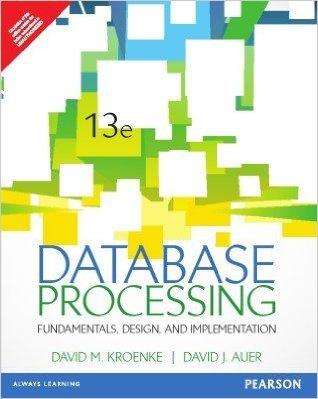Question
How do I make a lexical analyzer recognize a relational operators = be recognized as one lexeme instead of two sepeate lexemes. Write a
How do I make a lexical analyzer recognize a relational operators "<=", ">=" be recognized as one lexeme instead of two sepeate lexemes. Write a code for this please. Use the below code.
/* front.c - a lexical analyzer system for simple
arithmetic expressions */
#include
#include
/* Global declarations */
/* Variables */
int charClass;
char lexeme[100];
char nextChar;
int lexLen;
int token;
int nextToken;
FILE *in_fp;
/* Function declarations */
int lookup(char ch);
void addChar(void);
void getChar(void);
void getNonBlank(void);
int lex(void);
void expr(void);
void term(void);
void factor(void);
/* Character classes */
#define LETTER 0
#define DIGIT 1
#define UNKNOWN 99
/* Token codes */
#define INT_LIT 10
#define IDENT 11
#define ASSIGN_OP 20
#define ADD_OP 21
#define SUB_OP 22
#define MULT_OP 23
#define DIV_OP 24
#define LEFT_PAREN 25
#define RIGHT_PAREN 26
#define MOD_OP 27
/******************************************************/
/* main driver */
int main(void) {
/* Open the input data file and process its contents */
if ((in_fp = fopen("front.in", "r")) == NULL)
printf("ERROR - cannot open front.in ");
else {
getChar();
do {
lex();
} while (nextToken != EOF);
}
return 0;
}
/******************************************************/
/* lookup - a function to look up operators and
parentheses and return the token */
int lookup(char ch) {
switch (ch) {
case '(':
addChar();
nextToken = LEFT_PAREN;
break;
case ')':
addChar();
nextToken = RIGHT_PAREN;
break;
case '+':
addChar();
nextToken = ADD_OP;
break;
case '-':
addChar();
nextToken = SUB_OP;
break;
case '*':
addChar();
nextToken = MULT_OP;
break;
case '/':
addChar();
nextToken = DIV_OP;
break;
case '=':
addChar();
nextToken = ASSIGN_OP;
break;
case '%':
addChar();
nextToken = MOD_OP;
break;
default:
addChar();
nextToken = EOF;
break;
}
return nextToken;
}
/******************************************************/
/* addChar - a function to add nextChar to lexeme */
void addChar(void) {
if (lexLen <= 98) {
lexeme[lexLen++] = nextChar;
lexeme[lexLen] = '\0';
} else
printf("Error - lexeme is too long ");
}
/******************************************************/
/* getChar - a function to get the next character of
input and determine its character class
This language transitions on every possible character
*/
void getChar(void) {
if ((nextChar = getc(in_fp)) != EOF) {
if (isalpha(nextChar))
/// (nextChar >= 65 && nextChar <= 90 ) ||
/// (nextChar >= 97 && nextChar <= 122) ||
charClass = LETTER;
else if (isdigit(nextChar))
/// (nextChar >= 48 && nextChar <= 57) ||
charClass = DIGIT;
else
charClass = UNKNOWN;
} else
charClass = EOF;
}
/******************************************************/
/* getNonBlank - a function to call getChar until it
returns a non-whitespace character */
void getNonBlank(void) {
while (isspace(nextChar))
getChar();
}
/******************************************************/
/* lex - a simple lexical analyzer for arithmetic
expressions */
int x;
int lex(void) {
lexLen = 0;
getNonBlank();
int x;
switch (charClass) {
/* Identifiers */
case LETTER:
addChar();
getChar();
while (charClass == LETTER || charClass == DIGIT) {
addChar();
getChar();
}
nextToken = IDENT;
break;
/* Integer literals */
case DIGIT:
addChar();
getChar();
while (charClass == DIGIT) {
addChar();
getChar();
}
nextToken = INT_LIT;
break;
/* Parentheses and operators */
case UNKNOWN:
lookup(nextChar);
getChar();
break;
/* EOF */
case EOF:
nextToken = EOF;
lexeme[0] = 'E';
lexeme[1] = 'O';
lexeme[2] = 'F';
lexeme[3] = '\0';
break;
} /* End of switch */
printf("Next token is: %d, Next lexeme is %s ",
nextToken, lexeme);
return nextToken;
} /* End of function lex */
void expr(void) {
printf("Enter
/* Parse the first term */
term();
/* As long as the next token is + or -, get
the next token and parse the next term */
while (nextToken == ADD_OP || nextToken == SUB_OP) {
lex();
term();
}
printf("Exit
}
/* term
Parses strings in the language generated by the rule:
*/
void term(void) {
printf("Enter
/* Parse the first factor */
factor();
/* As long as the next token is * or /, get the
next token and parse the next factor */
while (nextToken == MULT_OP || nextToken == DIV_OP || nextToken == MOD_OP) {
lex();
factor();
}
printf("Exit
}
/* factor
Parses strings in the language generated by the rule:
*/
void factor(void) {
printf("Enter
/* Determine which RHS */
if (nextToken == IDENT || nextToken == INT_LIT)
/* Get the next token */
lex();
/* If the RHS is (
left parenthesis, call expr, and check for the right
parenthesis */
else { if (nextToken == LEFT_PAREN) {
lex();
expr();
if (nextToken == RIGHT_PAREN)
lex();
else
error();
}
/* It was not an id, an integer literal, or a left
parenthesis */
else
error();
}
printf("Exit
}
Step by Step Solution
There are 3 Steps involved in it
Step: 1

Get Instant Access to Expert-Tailored Solutions
See step-by-step solutions with expert insights and AI powered tools for academic success
Step: 2

Step: 3

Ace Your Homework with AI
Get the answers you need in no time with our AI-driven, step-by-step assistance
Get Started


